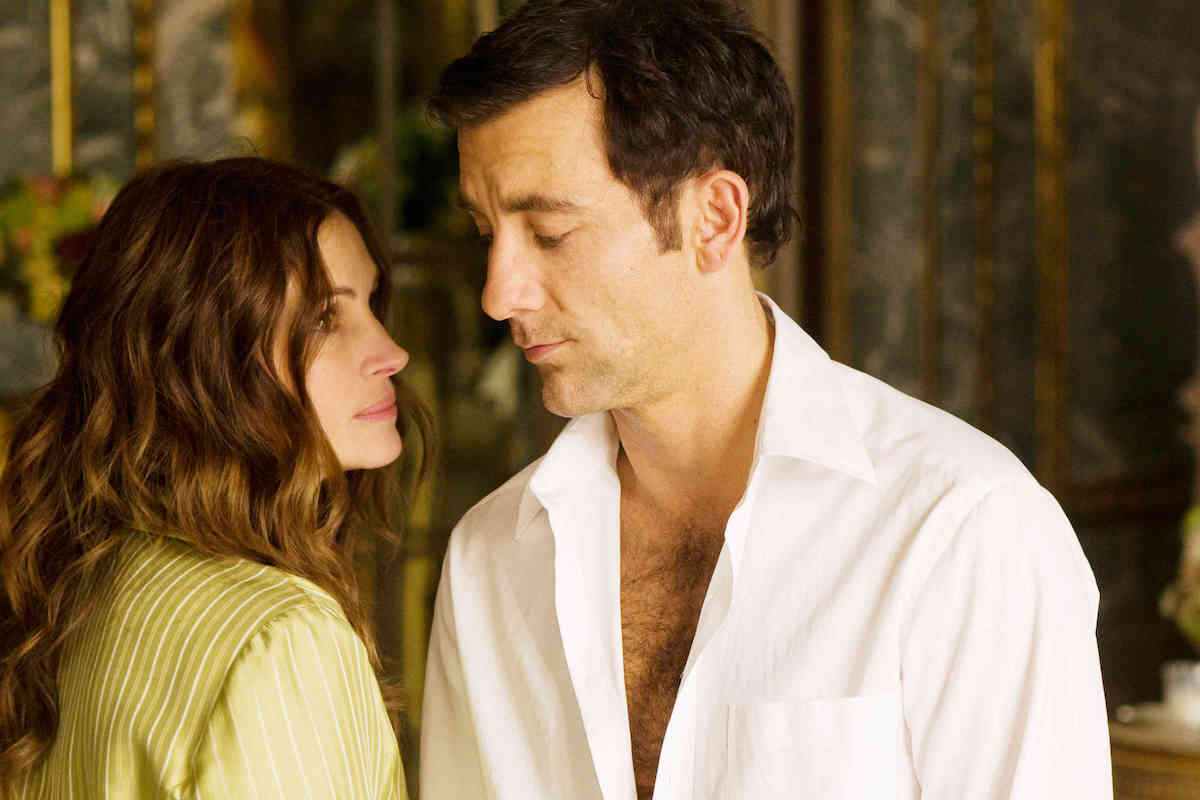Review: Duplicity

Duplicity opens quietly at an embassy soirée in Dubai. Clive Owen barely approaches Julia Roberts at the margherita table when we are thrust into this svelte little caper. Director Tony Gilroy, still glowing from the success of Michael Clayton, returns with his crack team (we’ll get to them) to create what this humble critic believes is the best major release of 2009 so far.
Mr. Owen and Ms. Roberts play Ray Koval and Claire Stenwick, two former state spies who take corporate intel positions at competing household products firms, Equikrom and Burkett & Randle (B & R). When B & R leaks the existence of a top secret project, the game is on to see who can get to the spoils first. That is really all I can put down here to keep the film interesting for you, so let’s dive into the meat of it.
The last time Owen and Roberts appeared together was in Mike Nichols’ 2004 study in sexual warfare, Closer. Sex is no less a weapon in this film, but this time around it is a hell of a lot more fun to watch. The relationship between the two harkens back to the days of Cary Grant and Katherine Hepburn; each one-upping the other’s tempestuousness with every scene. Mr. Owen slips into the role of debonair goofball perfectly, while Ms. Roberts is so good at reminding us of her fierce sexuality without ever letting us fully enjoy it. She holds it back until we can’t take it anymore. It feels as though the two were meant for each other as a comedy duo that dresses up like beautiful movie stars. They truly hit every beat on target.
Mr. Gilroy is neither a voracious historian like Steven Spielberg nor a sadistic cinema fetishist like Quentin Tarantino. Rather, he is a gifted storyteller whose propensity to base his films on those of another era has less to do with homage and more to do with a classical style of writing. He is not lifting his characters from other works specifically. Instead, he is relying on archetypes that have worked in cinema for six plus decades and bringing his own original and wholly modern voice to the table.
The director also is not afraid to build on the great work of his contemporaries. Specifically, James Newton Howard’s score (and musical selection) feels as though he spent a weekend picking the brain of David Holmes, the DJ and composer who provided the signature beat to all three of Stephen Soderbergh’s _Ocean’s _films. In other ways, like the use of intercut flashbacks and implementation of the split screen, the film seems to be building on those three heist films as well. This is not plagirism, but instead a doff of the cap as the filmmakers each move the genre forward in different diresctions.
Visually speaking, the inimitable Robert Elswit brings his standard “A” game. Just as he did for the city in Michael Clayton, Mr. Elswit brings New York to life. Neither the glitzy, sterile dreamland of Sex and the City, nor the gritty underbelly we see in Richard Donner’s forgettable 16 Blocks, Elswit brings to light a Manhattan that is at once mysterious and overwhelming, beautiful and foreboding; the international epicenter of business, art, fashion and industry that is sure to enchant whether you love it or hate it. It is one of the most accurate portrayals of the city I have seen this decade. It seems filmmakers have been struggling to represent New York ever since it became cleaner and safer (read: less interesting) through the 1990s, so it’s nice to see it look so good again.
Paul Giamatti and Tom Wilkonson fill their roles as rival CEOs beautifully. Giamatti is the stubby and insecure Richard Garsik, head of Equikrom, while Wilkinson is the cocksure and mysterious Howard Tully at B & R. The film’s opening credits features the two in a fist fight in the rain. The sequence is peak filmmaking; the two actors tustle and flop around with perfect comedic awareness. Giamatti is given siginificantly more screen time during which he shines, particularly in his final scene at a shareholders conference. I couldn’t help but think of Steve Ballmer’s sweaty “Developers” rant, which is perfect because this is the kind of man that Garsik is: paranoid, calculating and incapable of accepting defeat.
The corporate buffoonery that fills Duplicity’s runtime comes not a moment too soon. Many believe that pure escapism is what will tie Hollywood over through this recession instead of stories that deal with our trouble head-on. This film offers us the best of both worlds. Mostly, it is pure unadulterated fun. The people and locations are beautiful while the spy games are sexy and non-violent. Still one can’t help but choke on some of those laughs as CEOs and other haves get each other in the kind of trouble that only hurts the have-nots in the end. In my opinion, there is an underlying message to this film: in these uncertain times the reckoning will come to us all, unless of course you are the smartest one in the room. Finding out who comes out on top by the end of Duplicity is surely an experience worth having.